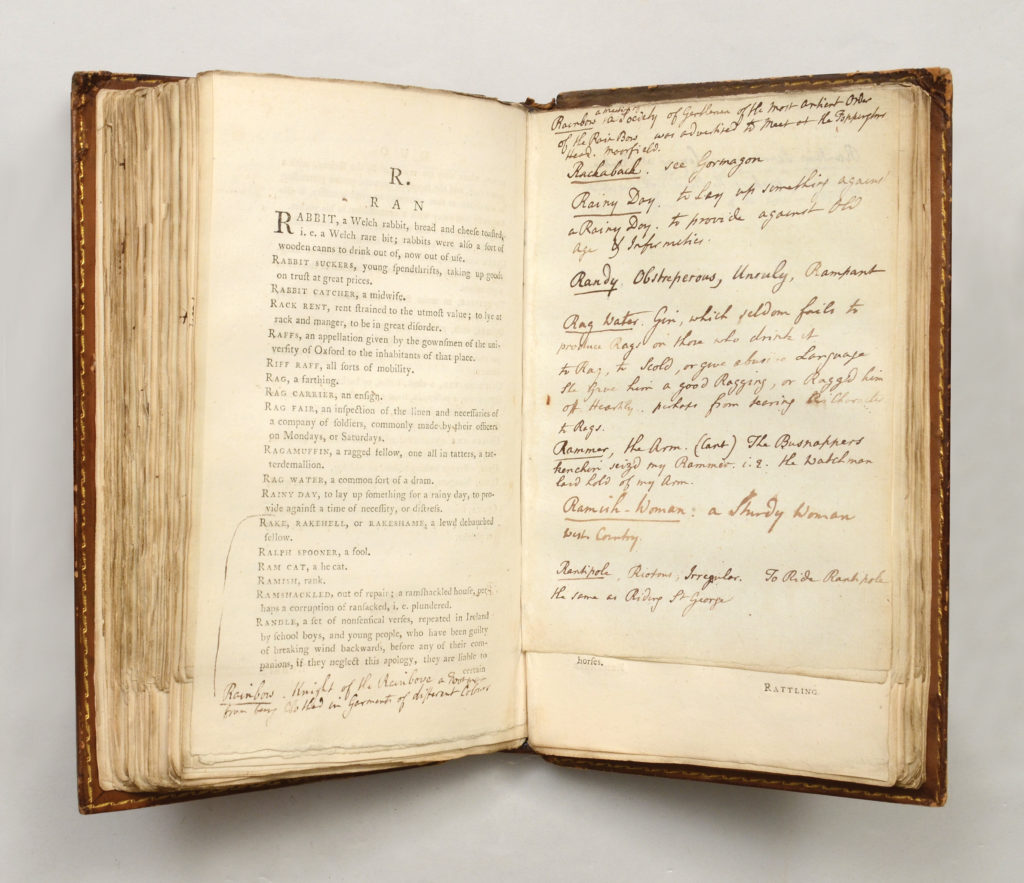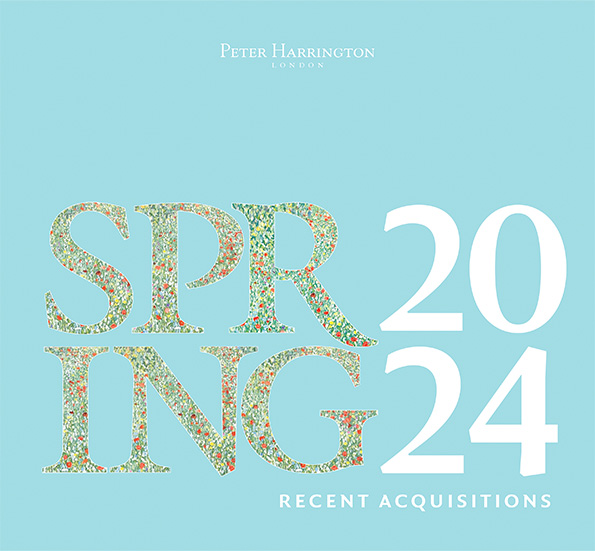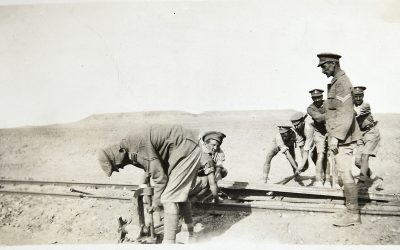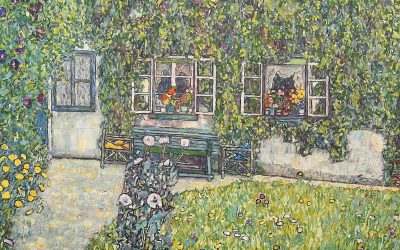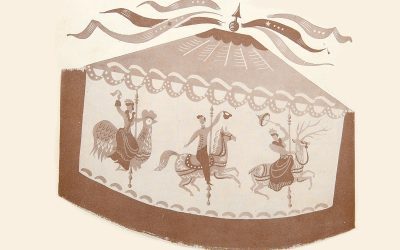For those who understand that the right and proper use of a dictionary is looking up rude words, this book might just be the perfect copy of the perfect dictionary. Francis Grose’s dictionary of slang, The Classical Dictionary of the Vulgar Tongue (UPDATE BOOK SOLD), 1785 is the founding text of obscene lexicography, and we have acquired the author’s own copy of the first edition, thoroughly annotated by him with additions (and some expurgations) in preparation for the second edition of 1788.
Francis Grose (1731-1791) was well-described by Eric Partridge, his 20th-century counterpart in the field of slang lexicography, as “the greatest antiquary, joker, and porter-drinker of his day, and one of the happiest wits of the late 18th century”. Through a varied life, including a long military career, he sustained an enthusiastic philological interest, and his keen ear for linguistic curios both military and demotic meant that the first edition of his Classical Dictionary of the Vulgar Tongue included some 9,000 words that had been omitted from Johnson’s Dictionary (BOOK SOLD).
Grose was certainly a committed field researcher; he used, along with his assistant Tom Cocking, to take walks, often at night, through the streets, slums, docks and drinking dens of London in order to pick up the latest slang terms.

Francis Grose. By D. O. Hill. from The Land of Burns by Wilson & Chambers (Glasgow: Blackie & Son, 1840). In 1789, Robert Burns met and befriended Grose, about whom he wrote a number of poems almost as rude as their subject.
Grose’s copy reads like a commonplace book for these wanderings, and contains over 1,000 manuscript additions. Some reveal the roots of now-standardised terms, such as ”Sweet Heart: …a Girl’s Lover, or a Man’s Mistress. Originally a sweet cake in the shape of a heart.” Some are highly expressive, but now almost lost, like ”Rantipole: riotous, irregular”, or “Knight of the Trencher: a great eater” (which Grose, who made much of the pun in his name, certainly was). Some have changed in modern usage: ”Hoity Toity: a Hoity Toity wench, a giddy thoughtless ramping girl”. Some phrases, like “One of the Blue Squadron: any person having a cross of the black breed. An East India Term”, indicate the influence of empire on the language.
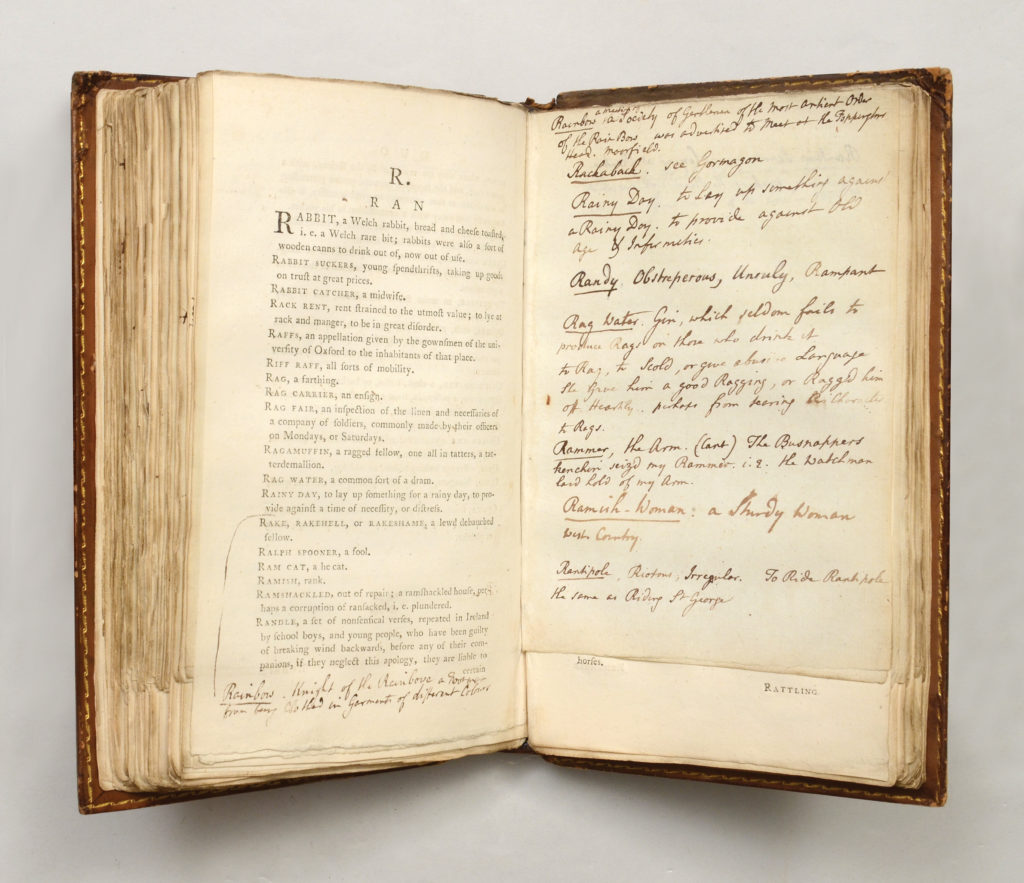
Most prominently, many of Grose’s additions offer an insight into life in late 18th-century London: “Comus’s Court” is “a social meeting held at the Half Moon Tavern, Cheapside”; “Tangier” is “a Room in Newgate where Debtors are Confined. Thence called Tangierines”; numerous secret societies and clubs, including the Kit Cat Club, are named; and “sandwich” gets a timely mention, as “ham, tongue, or some other salted meat, cut thin & put between two slices of bread & butter, said to be a favorite morsel with the E. of Sandwich” (John Montagu, 4th Earl Sandwich, 1718-92).
All the aforementioned contributions, however, are to be found printed in the second edition. What makes this copy particularly valuable are the many terms added here that you will not find in the 1788 edition. This is because the book has been extensively bowdlerized; there are almost 100 expurgations all marked by a red cross.
In the preface to the first edition, Grose had attempted to excuse such terms as “commodity: a woman’s commodity, the private parts of a modest woman, and the public parts of a prostitute”, and “burning shame: a lighted candle stuck into the private parts of a woman, certainly not intended by Nature for a candlestick”, on the grounds that they “compensate by their wit, for the trespass committed on decorum”.

The reading public, however, whose tastes were shifting away from the bawdy sensibilities of 18th-century Grub Street towards the primmer and more prudish mores of the 19th century, did not see eye-to-eye with Grose on the matter. Thus, such terms as were “pointed out as rather indecent or indelicate … have been either omitted, softened, or their explanations taken from books long sanctioned with general approbation, and admitted into the seminaries for the education of youth…“ (1788 Preface).
Certainly it was not Grose’s own sense of personal propriety that prompted these removals, as can be seen in the many obscene terms (ranging from the basic, “fun thruster: a sodomite”, to the bizarre, “nonsense: a girl playing with a dead man’s penis”) being continually added in manuscript, and only afterwards marked for expurgation with a rueful red cross.


One can sense Grose’s irritation at the enforced bowdlerization of his great lexicographical project in the closing words of the 1788 preface: “it is hoped this work will now be found as little offensive to delicacy as the nature of it would admit.” We propose, therefore, to correct this prudery, and publish here a selection of Grose’s unpublished additions:
- Apple Dumpling Shop: A woman’s bosom.
- Arbor Vitae: A man’s penis.
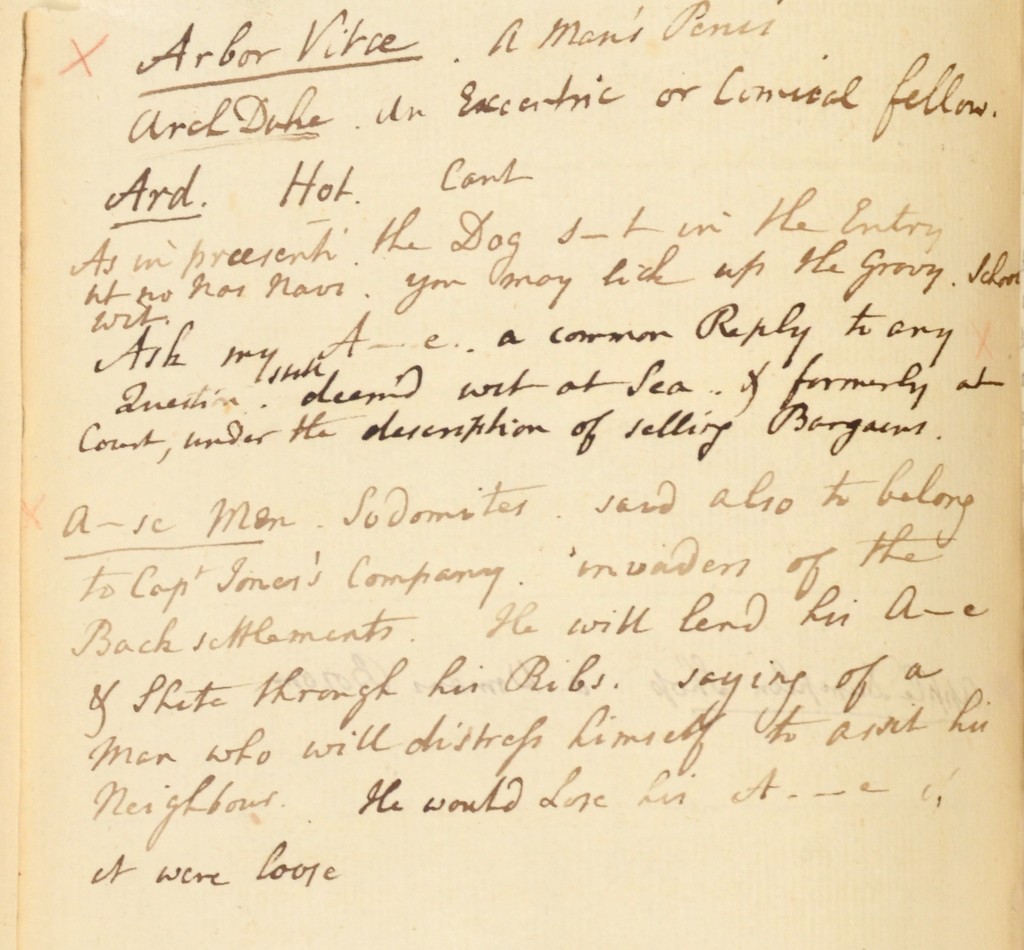
- Arse Men: Sodomites. Said also to belong to Captain Jones’s company. Invaders of the back settlements.
- Barber’s Sign: A standing pole & two wash balls .
- Bitch …instead of the appellation of “bitch” the blackguards sometimes say, “your arse is a carrion gallows, because ‘tis hung round with Dog’s meat.”
- Coney Court: A court in Gray’s Inn. “To sleep in Coney (i.e. Cunny) Court.” To lie all night with a girl. “I breakfasted in Milk Street, dined in Butcher’s Rowe, sup’d in Philpot (Fillpot) Lane & slept in Coney Court.” i.e. I had milk for breakfast, beef steaks for dinner, got tipsey with porter at night and slept with a wench.
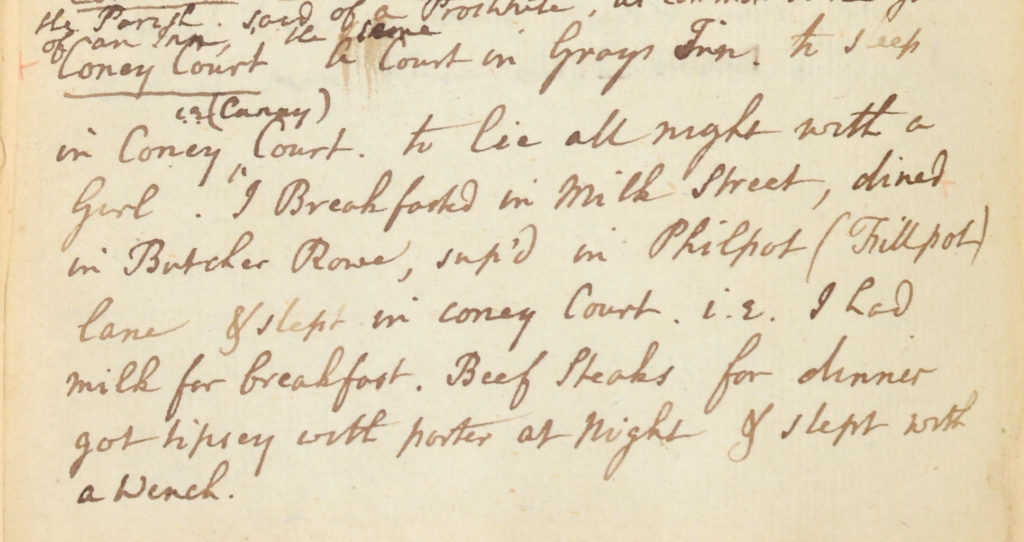
- Diddys: A woman’s breasts. Or Bubbies.
- Flogging Cully: A debilitated letcher (commonly an old one) whose torpid powers require stimulating with a rod. One who hires girls to flog him on the posteriors, in order to procure an erection.
- Goose Neck and Giblets: A man’s tackle. “She longed for a goose neck & giblets. For the child carries the mark.” i.e. She is delivered of a son.
- Scurvy Wench: A woman who wants hair on a certain part. Who has f**ked herself with a piece of salt beef, & given her c**t the scurvy. Point of Portsmouth wit.

- Thing: A woman’s commodity. A West Country clown being asked on the next morning after his marriage if he had found his wife’s thing, replied that he had “a’found un, tho’ the cunning jade had wrapt’un up in an old thing & hid un between her thighs”.
- Turd Hampers: Breeches.
- Wheel Barrow Fashion: A mode of enjoying a woman which needs no explanation to such as have seen a man make use of a wheel barrow.
The book is also peppered with jokes, anecdotes and snatches of verse that clearly amused or interested its author, some of which have only a tangential (and occasionally no) place as additions to the text at hand, but which nonetheless wonderfully express Grose’s “jolly, jovial earthiness” (Partridge); for example, the following obscene verse:
“With such violent rage, Sir John did engage
With the girl that he laid his leg on,
That his squire, who stood near,
Swore it looked like the spear
Of St George in the mouth of the Dragon.”
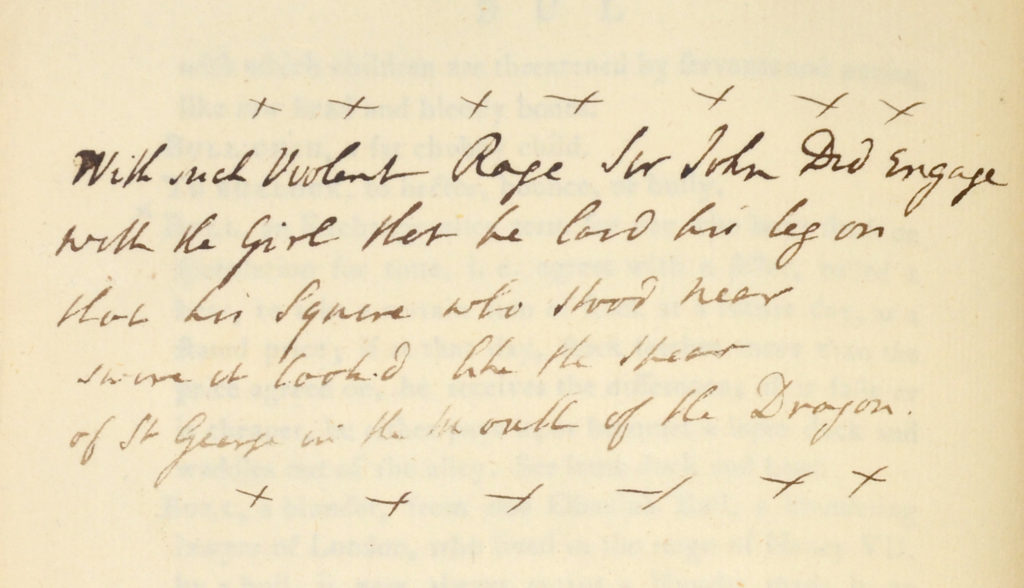
This copy, then, with all the content of the first edition, most of the second edition, and much additional material not included in either, must constitute a uniquely important linguistic and historical source, as well as being a material artifact preserving the character of one of 18th-century England’s grossest men, and, of course, an unparalleled repository of rude words.
Click here here to see our complete selection of items related to Dictionaries and Encyclopedias.

